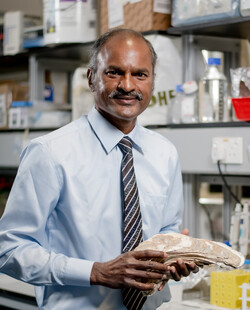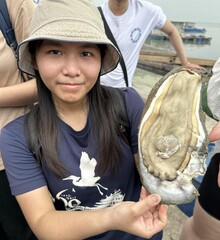Listen to this article:
‘We are promoting “Oyster Aquaculture Alliance for One Health” to introduce innovative technologies for modernising oyster aquaculture and foster collaboration among researchers and stakeholders.’
Principal Investigator // Professor Thiyagarajan VENGATESEN, Professor of the School of Biological Sciences and the Swire
Institute of Marine Science, and the Director of Hong Kong Oyster Hatchery and Innovation Research Unit (HKO-HIRU)
Institute of Marine Science, and the Director of Hong Kong Oyster Hatchery and Innovation Research Unit (HKO-HIRU)

Professor Thiyagarajan VENGATESEN
School of Biological Sciences, and
Swire Institute of Marine Science
In the face of significant threats from altered coastal habitats by human and climate change, oyster cultivation in Hong Kong and south China encounters hurdles. Elevated temperatures, ocean acidification and altered seasonality, i.e. warmer winters with less rain, compromise the immune systems and activate the reproductive system in the wrong time in these delicate creatures, rendering them susceptible to infections and causing substantial losses for growers. Their limited tolerance for heat and salt in challenging environments also poses a significant obstacle to achieving sustainable farming.
‘That’s why we’re trying to breed high-stress tolerant oysters to mitigate these issues and help growers in the area to expand their culture in saltier areas of estuarine and coastal habitats,’ said Professor Vengatesen.
The HKU Oyster Hatchery, under Professor Vengatesen's leadership and funded by the HKSAR government via the Sustainable Fisheries Development Fund (SFDF), plays a pivotal role in producing oyster seeds with specific traits, such as high salinity and stress resistance. A diverse team of experts from aquaculture, molecular biology, and genomics, studies adaptive and tolerance mechanisms to identify stress tolerant-genes, peptides and proteins in various oyster populations and species.
 Through SNP (Single Neutcletide Polymorphism) marker – assisted selective breeding approach in close collaboration with local growers who are engaged in traditional selection process over centuries, the hatchery endeavours to craft oyster strains tailored to the local environment, focusing on climate change impacts to enhance resilience. Notably, it has successfully delivered over 5,000 strings of seeds obtained from those stress-resilient broods to the local oyster growers in Lau Fau Shan area of Hong Kong. This season marks a significant milestone as the hatchery announces the successful production of its inaugural batch of triploid oyster seeds of those stress-resilient populations, with ongoing monitoring to assess their performance.
Through SNP (Single Neutcletide Polymorphism) marker – assisted selective breeding approach in close collaboration with local growers who are engaged in traditional selection process over centuries, the hatchery endeavours to craft oyster strains tailored to the local environment, focusing on climate change impacts to enhance resilience. Notably, it has successfully delivered over 5,000 strings of seeds obtained from those stress-resilient broods to the local oyster growers in Lau Fau Shan area of Hong Kong. This season marks a significant milestone as the hatchery announces the successful production of its inaugural batch of triploid oyster seeds of those stress-resilient populations, with ongoing monitoring to assess their performance. ‘Hatchery seeds are expected to have a very high success rate compared to wild seeds, as they have been fed with high-quality food,’ Professor Vengatesen remarked. ‘Using our innovative high-density recirculating hatchery facility, we can easily produce 24 million seeds using just six tanks of 500 L capacity in the breeding season,’ he added.
Collaborative Research and Breeding Efforts
As the hatchery expands genetic diversity and enhances stress tolerance in oyster strains, it also actively explores sustainable production techniques. This includes optimising resource utilisation, reducing waste, and minimising the environmental impact of oyster aquaculture. ‘Our multidisciplinary approach allows us to address the complex challenges oysters face in their environment, ’Professor Vengatesen explained.
Strengthening Industry Ties, Knowledge Sharing and Public Education
The project has developed impactful technologies in collaboration with growers in South China and Lee Kum Kee Co. Ltd. By nurturing collaborations with local oyster farmers, scientists, and industry stakeholders, the hatchery aims to facilitate knowledge sharing, exchange best practices, and work collectively towards sustainable growth and development of the oyster industry not only in Hong Kong but also in south China. ‘Collaboration and knowledge sharing are essential for the continued success of the oyster aquaculture industry,’ Professor Vengatesen affirmed, underscoring the importance of the collaboration.
The hatchery plays a vital role in public education about the ecological significance of oysters, promoting sustainable aquaculture practices, and raising awareness about the cultural importance of oysters in the region. Through various initiatives and programmes, the hatchery aims to foster a greater understanding of the value of oyster aquaculture among the public. ‘We aim to educate the public about the ecological and cultural significance of oyster aquaculture in Hong Kong,’ Professor Vengatesen supplemented.
Looking Towards the Future
As we envision the future of oyster aquaculture in Hong Kong, it is evident that the dedication and innovative approach of researchers like Professor Vengatesen and the HKU Oyster Hatchery has become paramount. Fostering collaboration, knowledge sharing, and a commitment to sustainability ensures the sector's thriving continuation, preserving cultural heritage and ecological significance for generations to come.
| < Previous | Next > |

